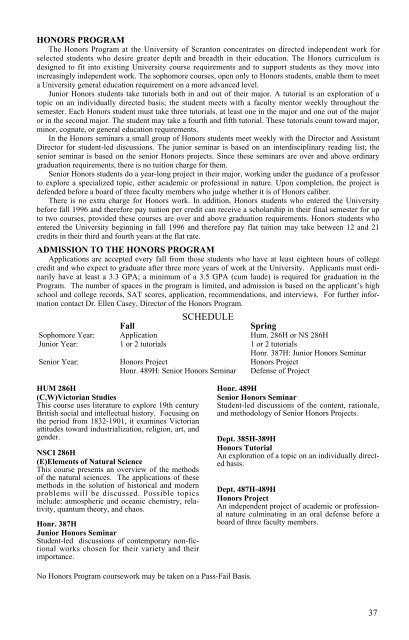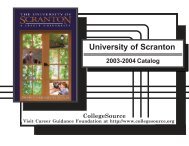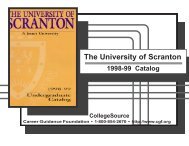Create successful ePaper yourself
Turn your PDF publications into a flip-book with our unique Google optimized e-Paper software.
HONORS PROGRAM<br />
<strong>The</strong> Honors Program at the <strong>University</strong> <strong>of</strong> <strong>Scranton</strong> concentrates on directed independent work for<br />
selected students who desire greater depth and breadth in their education. <strong>The</strong> Honors curriculum is<br />
designed to fit into existing <strong>University</strong> course requirements and to support students as they move into<br />
increasingly independent work. <strong>The</strong> sophomore courses, open only to Honors students, enable them to meet<br />
a <strong>University</strong> general education requirement on a more advanced level.<br />
Junior Honors students take tutorials both in and out <strong>of</strong> their major. A tutorial is an exploration <strong>of</strong> a<br />
topic on an individually directed basis; the student meets with a faculty mentor weekly throughout the<br />
semester. Each Honors student must take three tutorials, at least one in the major and one out <strong>of</strong> the major<br />
or in the second major. <strong>The</strong> student may take a fourth and fifth tutorial. <strong>The</strong>se tutorials count toward major,<br />
minor, cognate, or general education requirements.<br />
In the Honors seminars a small group <strong>of</strong> Honors students meet weekly with the Director and Assistant<br />
Director for student-led discussions. <strong>The</strong> junior seminar is based on an interdisciplinary reading list; the<br />
senior seminar is based on the senior Honors projects. Since these seminars are over and above ordinary<br />
graduation requirements, there is no tuition charge for them.<br />
Senior Honors students do a year-long project in their major, working under the guidance <strong>of</strong> a pr<strong>of</strong>essor<br />
to explore a specialized topic, either academic or pr<strong>of</strong>essional in nature. Upon completion, the project is<br />
defended before a board <strong>of</strong> three faculty members who judge whether it is <strong>of</strong> Honors caliber.<br />
<strong>The</strong>re is no extra charge for Honors work. In addition, Honors students who entered the <strong>University</strong><br />
before fall 1996 and therefore pay tuition per credit can receive a scholarship in their final semester for up<br />
to two courses, provided these courses are over and above graduation requirements. Honors students who<br />
entered the <strong>University</strong> beginning in fall 1996 and therefore pay flat tuition may take between 12 and 21<br />
credits in their third and fourth years at the flat rate.<br />
ADMISSION TO THE HONORS PROGRAM<br />
Applications are accepted every fall from those students who have at least eighteen hours <strong>of</strong> college<br />
credit and who expect to graduate after three more years <strong>of</strong> work at the <strong>University</strong>. Applicants must ordinarily<br />
have at least a 3.3 GPA; a minimum <strong>of</strong> a 3.5 GPA (cum laude) is required for graduation in the<br />
Program. <strong>The</strong> number <strong>of</strong> spaces in the program is limited, and admission is based on the applicant’s high<br />
school and college records, SAT scores, application, recommendations, and interviews. For further information<br />
contact Dr. Ellen Casey, Director <strong>of</strong> the Honors Program.<br />
SCHEDULE<br />
Fall Spring<br />
Sophomore Year: Application Hum. 286H or NS 286H<br />
Junior Year: 1 or 2 tutorials 1 or 2 tutorials<br />
Honr. 387H: Junior Honors Seminar<br />
Senior Year: Honors Project Honors Project<br />
Honr. 489H: Senior Honors Seminar Defense <strong>of</strong> Project<br />
HUM 286H<br />
(C,W)Victorian Studies<br />
This course uses literature to explore 19th century<br />
British social and intellectual history. Focusing on<br />
the period from 1832-1901, it examines Victorian<br />
attitudes toward industrialization, religion, art, and<br />
gender.<br />
NSCI 286H<br />
(E)Elements <strong>of</strong> Natural Science<br />
This course presents an overview <strong>of</strong> the methods<br />
<strong>of</strong> the natural sciences. <strong>The</strong> applications <strong>of</strong> these<br />
methods in the solution <strong>of</strong> historical and modern<br />
problems will be discussed. Possible topics<br />
include: atmospheric and oceanic chemistry, relativity,<br />
quantum theory, and chaos.<br />
Honr. 387H<br />
Junior Honors Seminar<br />
Student-led discussions <strong>of</strong> contemporary non-fictional<br />
works chosen for their variety and their<br />
importance.<br />
No Honors Program coursework may be taken on a Pass-Fail Basis.<br />
Honr. 489H<br />
Senior Honors Seminar<br />
Student-led discussions <strong>of</strong> the content, rationale,<br />
and methodology <strong>of</strong> Senior Honors Projects.<br />
Dept. 385H-389H<br />
Honors Tutorial<br />
An exploration <strong>of</strong> a topic on an individually directed<br />
basis.<br />
Dept. 487H-489H<br />
Honors Project<br />
An independent project <strong>of</strong> academic or pr<strong>of</strong>essional<br />
nature culminating in an oral defense before a<br />
board <strong>of</strong> three faculty members.<br />
37
















